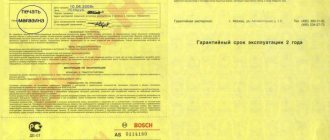Roman Alymov, a lawyer and legal consultant for the online repair ordering ecosystem Rewedo.ru, answers:
The management company is wrong in the wording, but right in essence. Contribution for major repairs is mandatory for everyone, even for residents of new buildings, who are still very far from major repairs. It is assumed that in capital repair funds, funds are accumulated through payments from all owners in general and are simultaneously distributed for the repair of those houses where it is needed. It turns out that the money you paid should go towards repairing other people’s houses, but your house will also have to be repaired in due time using funds paid by someone else.
But all this has nothing to do with the developer’s warranty obligations. The developer is obliged, according to the contract concluded between you, to provide you with an apartment of proper quality, and it must correspond to this quality during the entire warranty period.
If there are any questions about the quality of your apartment specifically, you can make a claim directly to the developer, based on the provisions of the contract concluded with him. So the management company, answering that the guarantee does not apply, is wrong: You can make claims to the developer regarding the quality of the housing, but you are still required to pay a contribution for major repairs.
At the moment, the housing legislation of the Russian Federation is on the side of the management company, since the contribution for major repairs is mandatory, in addition, SU-155 is already in the stage of liquidation after the bankruptcy procedure and the guarantees will not be fulfilled by the management company. But there is another option. You can initiate a meeting of the residents of your house with the aim of changing the management code of your house. You will not be exempt from mandatory contributions for major repairs, but from the moment you select a management company under your control, you will be able to control the funds that go to major repairs.
Can I avoid paying for major repairs?
Where do contributions for major repairs go?
Private lawyer Alexey Timofeev answers:
The management company explains it incorrectly, but it most likely acts absolutely correctly. The Housing Code of the Russian Federation provides a number of grounds under which apartment owners are exempt from the obligation to pay contributions for major repairs. Among them, there is no such reason as the fact that the house is under warranty from the developer.
The fact is that the capital repair program and the developer’s warranty obligations are of a different nature. Warranties are short-term, and major repairs are planned decades later. Major road repairs, therefore, the legislator says, it is necessary to collect funds for it now.
In part 5.1. Art. 170 of the RF Housing Code establishes that the obligation to pay for major repairs arises for owners of apartments in new buildings after the expiration of the period established by the constituent entity of the Russian Federation (but not more than five years) after the house has been included in the regional major repair program. This period is established by Part 3.1. Art. 75 of the Law of Moscow dated January 27, 2010 No. 2 “Fundamentals of housing policy of the city of Moscow” and is equal to six months.
General information from this law
There was real confusion in the housing sector until December 2012. Many citizens are accustomed to the fact that major repairs are carried out by the state , while others have long paid for the modernization of their apartment building from their own funds (read how legal such fees for major repairs are here, and from this material you will find out whether such contributions were declared illegal by the Constitutional Court and the Prosecutor General's Office of the Russian Federation ).
In December 2012, the Government of our country adopted Law No. 271 - Federal Law on Major Repairs - and signed by the President of the country. This regulatory act not only introduced a grain of reason into the Housing Code, which had been confusing up to this point, but also contained some innovations. You can learn more about the innovations that have been introduced into the legislation regarding major repairs recently from a separate publication, and if there is a law in the Russian Federation regulating the procedure for carrying out major repairs, read here.
This regulatory act was called the Federal Law on Amendments to the Housing Code of the country, as well as some other regulations No. 271 of December 25, 2012. The Federal Law on Payment for Major Repairs conveys information that citizens are required to pay their own fees for major repairs . Before this, no law had ever regulated this item.
In addition, now the Federal Law on the exemption of fees for major repairs has also acquired a list of persons who, to one degree or another, are fully or partially exempt from payments . Until the release of Law 271 on capital repairs, the categories of beneficiaries were not clearly defined, and this issue remained under regional rather than federal jurisdiction.
The new regulatory legal act has become a kind of code that contains all the nuances of implementation and preparation for major repairs. It is curious that the Federal Law on the payment of contributions for major repairs, at the official level, allowed the regions to independently set the cost of the contribution for each square meter of real estate.
Reference: cities of federal significance (Moscow and St. Petersburg) must pay amounts slightly higher than other settlements of regional or district significance.
The reaction of citizens to this regulatory act was ambiguous. Someone was glad that the time of arbitrariness on the part of unscrupulous owners and employees of management organizations would finally end and the repairs would be carried out not only in accordance with the deadlines, but also in accordance with the regulations. Some, on the contrary, were outraged by the legally established obligation to pay contributions without fail .
Some did not like the inflated prices for tariffs in comparison with other regions, and others were horrified by the established sanctions for non-payment (Article 155). One way or another, Federal Law 271 - the Federal Law on Major Repairs, did not leave anyone indifferent, however, its individual articles deserve close attention.
However, this normative act cannot cover all issues related to overhaul. Thus, issues related to the formation of the fund relate to Law 185 on capital repairs. The nuances of carrying out major repairs and the selection of personnel to carry out the work are not related to the maintenance of these acts. However, to do this, you can refer to the Federal Law and, by placing a tender, select the most profitable supplier of services and materials.
Legal adviser Roman Azatyan answers:
In accordance with paragraph 1 of Art. 169 of the Housing Code of the Russian Federation, owners of residential premises in an apartment building are required to pay contributions for major repairs, with the exception of certain cases:
- the living space is in disrepair;
- the executive body of state power has decided to seize residential premises for state or municipal needs;
- the minimum amount of the capital repair fund has been reached, which was adopted by the owners at the general meeting;
- in other cases provided for by law, to avoid repeated work, if such work has been carried out.
The obligation to pay contributions for major repairs lies with the owners, regardless of whether the house is new or not. The guarantee from the developer stipulates that if during the warranty period there is a need to repair common property, the costs will be borne by the developer and not the owners.
What is the service life of today's new buildings?
Ventilation does not work in apartments - what to do?
Sergey Ilyasaev, General Director of Rezidential Group, answers:
First of all, let's define the concepts that are discussed in this question. Warranty repairs and major repairs are completely different things. If we are talking about major repairs of a building, according to Article 154 of the Housing Code of the Russian Federation, a monthly payment for it is mandatory for all owners of premises. Now it is 15 rubles per 1 sq. meter of total living space per month.
Residents of both old houses and new buildings are required to contribute these funds. Therefore, the requirements of the management company and the invoices it issues are legal. By the way, from July 1, 2021, the minimum contribution for major repairs of common property in an apartment building in Moscow will change and will be 17 rubles per 1 sq. m. meter.
However, there are regions in Russia (for example, the Novosibirsk region) where residents of houses put into operation less than five years ago have the right not to pay for major repairs. In the near future, such an amnesty may extend to all regions. If the practice of exempting residents of new buildings from paying for major repairs is adopted in Moscow, funds paid before the adoption of the relevant amendments to the Housing Code may be offset for future periods.
References to the fact that the developer of the house is bankrupt and the house is under warranty are not relevant to the issue of major repairs. If the buyer has any complaints about the quality of housing construction accepted under the transfer and acceptance certificate, he can present them to the developer’s legal successor. In particular, the client can eliminate warranty defects at his own expense and then bring them to court. However, in the case of the SU-155 company, the likelihood of achieving satisfaction of the claim is quite low.
What does the law say?
Federal Law on major repairs of apartment buildings 271
The adoption by the State Duma of this Federal Law was the beginning of the creation of a legal basis for the implementation of capital repair mechanisms in all regions of our country.
The main innovation in this act was the assignment of responsibilities for financing these works to the owners of premises in an apartment building.
Thus, Article 170 of this law states that the capital repair fund is formed by contributions from owners commensurate with the size of the property. Unfortunately, the law does not provide for amendments regarding liability for failure to carry out major repairs for owners and government agencies. But more than half of our country’s housing stock needs work.
It is important that the amendments made to Article 166 have now finally clarified the situation in terms of what specific work is included in the overhaul . Residents can familiarize themselves with the list and check for themselves how well the repair work has been carried out. What if you don’t pay for major repairs under Law 271? Despite all of the above, responsibility for the maintenance of housing in an apartment building lies with the owners in accordance with Article 158 of the Housing Code.
Overhaul according to Federal Law 185
Federal Law 185 on capital repairs of apartment buildings dated July 21, 2007 talks about exactly how the capital repair fund is formed, how it is opened, and also which structures can be entrusted with this action.
This regulatory act is a kind of manual for homeowners in an apartment building, which will tell you how to act after the delivery of the house when opening a fund for major repairs. It is useful for residents to know not only how this fund is formed, but also how specific checks and reporting on spent funds are carried out (Article 13 of the law).
In addition, it is important for residents to know that if they are in line to receive major repairs in their home, they can count on subsidies from the state. There are a number of state and regional programs that help citizens obtain additional funds for modernizing premises. This regulatory act, namely Article 20, describes the nature of subsidies, as well as the method of receiving them.
Major repairs according to 44 Federal Laws
Federal Law No. 44 of April 5, 2013 is considered the main regulatory act in the field of government contracts and procurement.
It is there that tenders are awarded and suppliers of various materials and services offer their services.
Many government organizations, including administrations and management companies formed by homeowners' associations, resort to this law in order to carry out major repairs in the most profitable manner.
This regulatory act talks about how to become a procurement participant, how to form tenders, select suppliers and what requirements your orders must meet. This law also describes the nuances of various types of procurement (Article 108 of the law).
Important! If you are new to the procurement field, you can first familiarize yourself with the general provisions , which will reveal to you the meaning of this process.
On our website you can also find out in more detail how the law regulates issues related to major repairs, what is said regarding this in the decisions of the Government, the Supreme Court and the Constitutional Court of the Russian Federation, and whether it is possible in court not to pay contributions for major repairs.








